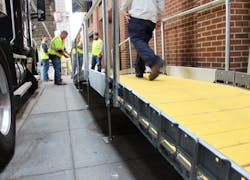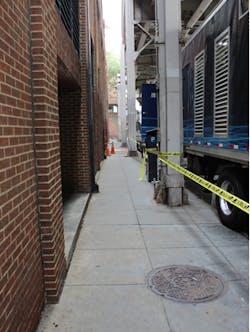Innovative ramp provides accessibility to sidewalk obstruction in D.C. work zone
Recently, transformer and substation maintenance provider Delta Star needed to provide the necessary service of installing accessibility to a sidewalk obstruction during renovations to a nearby apartment complex. A residential building in the Georgetown neighborhood of Washington D.C. needed transformer maintenance, and the hoses required for this project posed a pedestrian tripping hazard when they ran perpendicular to the sidewalk outside of the building.
Project planners initially requested a complete sidewalk closure during construction, but this request was denied due to the heavy foot traffic of residents in their daily commute.
After Delta Star was unable to gain approval for a complete sidewalk closure, they needed to find a way to safely channel pedestrian traffic over the obstacle. It was at this time that Delta Star discovered the PSS BoardWalk Ramp & Platform in their search for a solution. They consulted with PSS engineers to modify the original BoardWalk design to create the BoardWalk Bridge, which allowed for access over the sidewalk obstruction.
BoardWalk Ramp and Platform are modular, ADA-compliant devices that create continuous pedestrian navigation from roadway to sidewalk during temporary work zone projects. BoardWalk is typically installed perpendicular to the curb to transition from roadway to sidewalk. The BoardWalk Bridge, created for this project, was installed parallel to the curb. This allowed for pedestrians to travel over the obstruction while remaining continuously on the sidewalk.
Upon inspection of the jobsite, PSS engineers determined that an innovative solution would be needed due to the limited clearance and tight pathway in the obstructed region. Obstacles included a semitruck and trailer that was grounded by D.C. DOT until the completion of the project, two waterspout systems, and two steel girders that supported the bridge overhead.
PSS developed a customized modular BoardWalk Bridge system to solve this issue. BoardWalk’s ADA-compliant features include engineered, modular sections that maintain a maximum 1:12 slope ratio. Detectable edge castings provide guidance for pedestrians with cane and walking devices and prevent pedestrians in wheelchairs from roll-offs. BoardWalk is a requisite 4 ft wide and built with lumber that has a slip-resistant surface. Boardwalk is typically placed perpendicular to the street, allowing for ADA access up onto a curb, but in this instance the BoardWalk system was placed parallel to the street to allow pedestrians to travel over an obstruction along the sidewalk. Because BoardWalk is a modular system, customization was seamless for this project.
A palletized unit was shipped via truck, and Delta Star workers were trained on the proper alignment and assembly of BoardWalk sections. BoardWalk sections were then assembled and staged across the street from the obstructed sidewalk and later placed in the correct orientation over where the obstructing pipe would be placed after installation.
Once installed, the BoardWalk Bridge allowed for continuous and safe accessibility through the obstructed work zone, allowing pedestrians to continue along their normal commute in a high-traffic area.
The Delta Star crew reported their overall satisfaction as “extremely high.” When questioned about the features that were most important to the crew, modularity and durability were at the top of their priority list. The crew members also noted that they were impressed with how sturdy the interlocking connection was once assembled.
Using the adaptability of a modular system, the BoardWalk Bridge was able to accommodate traffic in a tightly restricted area blocked in by construction equipment and other environmental factors.


